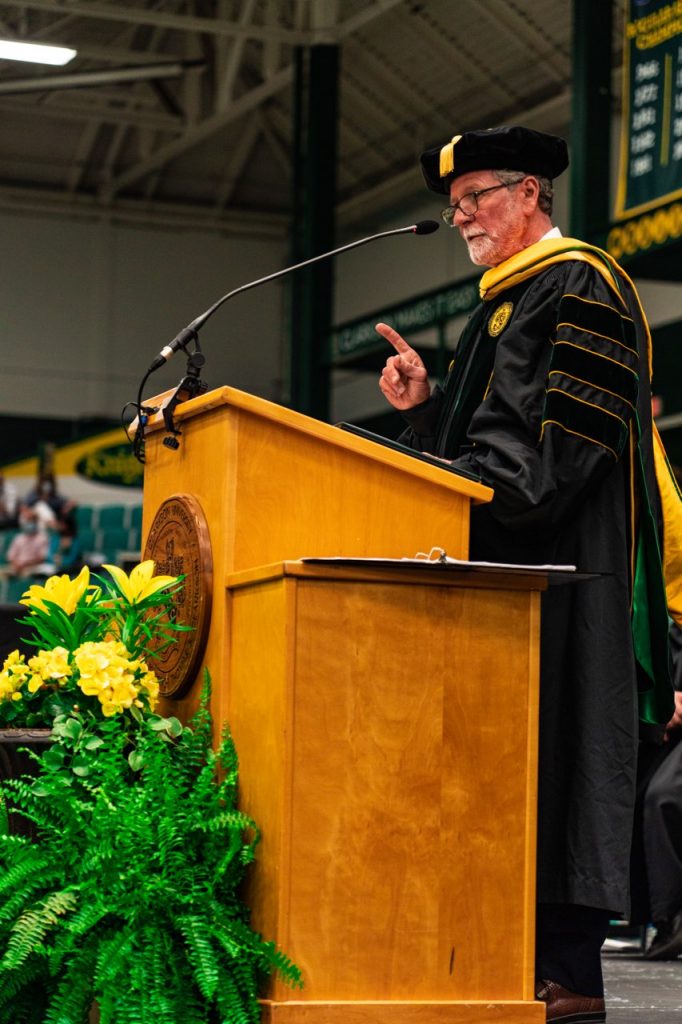W. John Kress, distinguished scientist and curator emeritus at the Smithsonian’s National Museum of Natural History, was awarded an honorary doctor of science degree at Clarkson University’s spring 2020 Commencement on Saturday, May 22.

The degree was awarded for “his dedication and distinguished leadership at the Smithsonian National Museum of Natural History, for his inspiring research of the Zingiberales order of flowering plants, and for his instrumental work in developing DNA barcoding for plants.”
Kress is a tropical biologist and is currently writing a book about the importance of the trees of North America, not only to our everyday lives, but in the global environment. “As more and more carbon dioxide is pumped into the atmosphere by people burning fossil fuels, the power of trees to suck carbon dioxide out of the air through photosynthesis is tremendous. In order to control climate change we need to promote reforestation on every continent, plant more trees, and conserve the forests that currently exist,” Kress said.
“You, the graduating class, are the generation that must be at the vanguard of a global movement to promote change in a right direction. It is most important that you as emerging citizens of our planet should graduate from Clarkson University with a new awareness and concern for the Earth,” Kress said.
Kress was curator of botany at the Smithsonian’s National Museum of Natural History for more than 30 years and formerly served as the interim under secretary for science at the Smithsonian and director of science in the Grand Challenges Consortia at the institution.
He is currently co-chair of the Earth BioGenome Project, an international effort to generate complete genomes for all species of plants, animals, and fungi on the planet.
Kress received his bachelor of arts degree from Harvard University and his Ph.D. from Duke University, where he studied tropical biology, ethnobotany, evolution, and ecology.
His taxonomic work on the Zingiberales, a group of tropical plants that includes gingers, bananas, and heliconias, has taken him around the world collecting plants and discovering new species.
Kress was instrumental in developing the genetic tool known as “DNA barcoding” for plants, which allows the accurate identification of plant species using a short, universal segment of DNA sequence.
His current research is focused on biodiversity genomics, conservation, and the Anthropocene.
Among his more than 250 scientific and popular papers are his books Plant Conservation – A Natural History Approach, The Weeping Goldsmith, The Art of Plant Evolution, Botanica Magnifica, and The Ornaments of Life – Coevolution and Conservation in the Tropics.
His most recent book is Living in the Anthropocene – Earth in the Age of Humans, which is about climate change and society.
Kress is currently writing The Smithsonian Guide to the Common Trees of North America to be published by Yale University Press.
He is a Fellow of the American Association for the Advancement of Science and received the Parker-Gentry Award for Biodiversity and Conservation from the Field Museum of Natural History and the Edward O. Wilson Biodiversity Technology Pioneer Award.
Kress serves as an affiliate faculty member at George Mason University, and is a visiting scholar at Dartmouth College and the Arnold Arboretum of Harvard University.
He lives in Dorset, Vt., with his wife, Dr. Lindsay L. Clarkson, M.D.
https://www.clarkson.edu/news/w-john-kress-awarded-clarkson-university-honorary-degree



